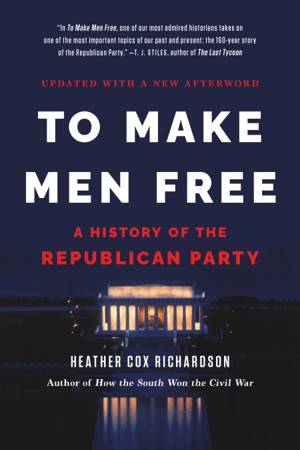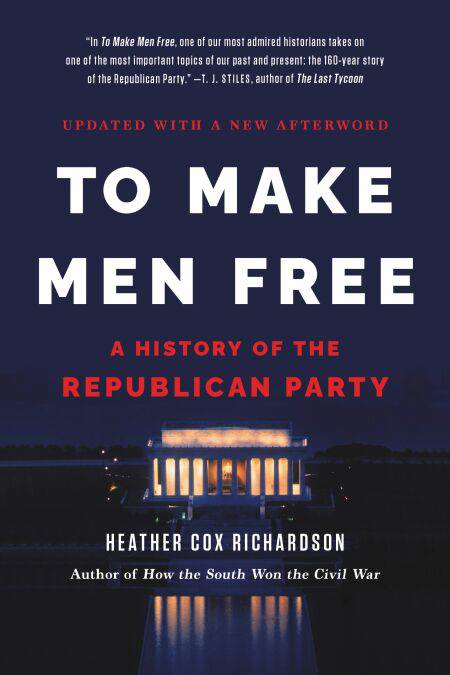
- Afhalen na 1 uur in een winkel met voorraad
- Gratis thuislevering in België vanaf € 30
- Ruim aanbod met 7 miljoen producten
- Afhalen na 1 uur in een winkel met voorraad
- Gratis thuislevering in België vanaf € 30
- Ruim aanbod met 7 miljoen producten
Zoeken
€ 11,99
+ 11 punten
Uitvoering
Omschrijving
From the New York Times bestselling author of Democracy Awakening, “the most comprehensive account of the GOP and its competing impulses” (Los Angeles Times)
When Abraham Lincoln helped create the Republican Party on the eve of the Civil War, his goal was to promote economic opportunity for all Americans, not just the slaveholding Southern planters who steered national politics. Yet, despite the egalitarian dream at the heart of its founding, the Republican Party quickly became mired in a fundamental identity crisis. Would it be the party of democratic ideals? Or would it be the party of moneyed interests? In the century and a half since, Republicans have vacillated between these two poles, with dire economic, political, and moral repercussions for the entire nation.
In To Make Men Free, celebrated historian Heather Cox Richardson traces the shifting ideology of the Grand Old Party from the antebellum era to the Great Recession, revealing the insidious cycle of boom and bust that has characterized the Party since its inception. While in office, progressive Republicans like Teddy Roosevelt and Dwight Eisenhower revived Lincoln's vision of economic freedom and expanded the government, attacking the concentration of wealth and nurturing upward mobility. But they and others like them have been continually thwarted by powerful business interests in the Party. Their opponents appealed to Americans' latent racism and xenophobia to regain political power, linking taxation and regulation to redistribution and socialism. The results of the Party's wholesale embrace of big business are all too familiar: financial collapses like the Panic of 1893, the Great Depression in 1929, and the Great Recession in 2008. With each passing decade, with each missed opportunity and political misstep, the schism within the Republican Party has grown wider, pulling the GOP ever further from its founding principles.
Expansive and authoritative, To Make Men Free is a sweeping history of the Party that was once America's greatest political hope -- and, time and time again, has proved its greatest disappointment.
When Abraham Lincoln helped create the Republican Party on the eve of the Civil War, his goal was to promote economic opportunity for all Americans, not just the slaveholding Southern planters who steered national politics. Yet, despite the egalitarian dream at the heart of its founding, the Republican Party quickly became mired in a fundamental identity crisis. Would it be the party of democratic ideals? Or would it be the party of moneyed interests? In the century and a half since, Republicans have vacillated between these two poles, with dire economic, political, and moral repercussions for the entire nation.
In To Make Men Free, celebrated historian Heather Cox Richardson traces the shifting ideology of the Grand Old Party from the antebellum era to the Great Recession, revealing the insidious cycle of boom and bust that has characterized the Party since its inception. While in office, progressive Republicans like Teddy Roosevelt and Dwight Eisenhower revived Lincoln's vision of economic freedom and expanded the government, attacking the concentration of wealth and nurturing upward mobility. But they and others like them have been continually thwarted by powerful business interests in the Party. Their opponents appealed to Americans' latent racism and xenophobia to regain political power, linking taxation and regulation to redistribution and socialism. The results of the Party's wholesale embrace of big business are all too familiar: financial collapses like the Panic of 1893, the Great Depression in 1929, and the Great Recession in 2008. With each passing decade, with each missed opportunity and political misstep, the schism within the Republican Party has grown wider, pulling the GOP ever further from its founding principles.
Expansive and authoritative, To Make Men Free is a sweeping history of the Party that was once America's greatest political hope -- and, time and time again, has proved its greatest disappointment.
Specificaties
Betrokkenen
- Auteur(s):
- Uitgeverij:
Inhoud
- Aantal bladzijden:
- 416
- Taal:
- Engels
Eigenschappen
- Productcode (EAN):
- 9780465080663
- Verschijningsdatum:
- 22/09/2014
- Uitvoering:
- E-book
- Beveiligd met:
- Adobe DRM
- Formaat:
- ePub

Alleen bij Standaard Boekhandel
+ 11 punten op je klantenkaart van Standaard Boekhandel
Beoordelingen
We publiceren alleen reviews die voldoen aan de voorwaarden voor reviews. Bekijk onze voorwaarden voor reviews.








